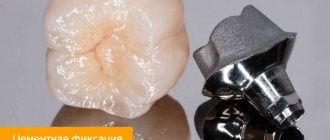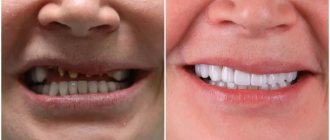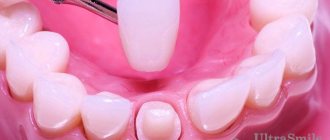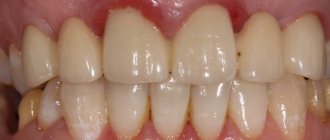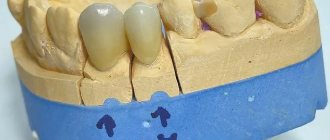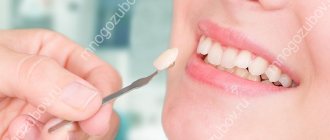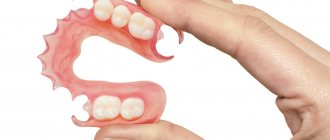Content
- Causes
- What to do if a crown falls out
- What can't you do?
- What to do if you can’t see a doctor right away
- What will the doctor do?
- How to prevent hair loss
The use of modern high-quality and high-tech materials does not make the service life of crowns unlimited. A dental crown has a specific lifespan of 12 years. Sometimes it happens that the crown falls out. Immediately after this trouble, increased sensitivity of the stump may appear. Contact your doctor without delay. If this is not possible, follow your doctor’s recommendations to save the tooth and reduce discomfort as much as possible.
What is the procedure if the crown comes off a tooth?
The problem can be resolved by visiting a dentist; you should make an appointment with him in the near future. The main thing to do before visiting a doctor:
- Save the prosthesis.
- Take care of the safety of the supporting unit: since the ground tooth is weakened, you should not chew on the problem side;
- Minimize the load on the area with the fallen structure;
- Carefully remove food particles from the dental stump and periodically rinse your mouth with an antiseptic solution.
If a temporary crown comes off, you should call the clinic, explain the situation and make an appointment. You should not hesitate with this issue, so as not to provoke gum influx. Then the permanent crown may not fit correctly.
If the crown has fallen off the implant, do not delay visiting the doctor. If the fixation is made using a screw connection and it is enough to simply fix it again.
Why is this happening
The following reasons for loss are possible:
- The service life of the cement has expired, the composition has lost its fastening properties - the crown has decemented;
- The patient put too much stress on the crown by including hard foods in the menu;
- During installation, temporary cement was used, which had to be replaced at the appointed time;
- A destructive process was underway under the crown - caries developed, as a result, the tightness of the connection was broken;
- The person often consumed chewing candies and toffees - the viscous consistency of the products contributed to the tearing of the crown from the tooth;
- The crown was placed on a tooth that was too small, and the insufficient tooth height reduced the bond;
- The size of the crown exceeded the size of the stump;
- The tooth stump turned out to be pointed, so the crown was weakly fixed;
- The material used to make the prosthesis was not strong enough.
PROMOTION
Installation of crowns, dental bridge
RUB 3,450
Does it hurt to remove a crown?
No, especially if the procedure is performed under anesthesia. Removing a crown from a tooth is painful if there is a living tooth underneath it that is undergoing an inflammatory process, but in the vast majority of cases, crowns are placed on pulpless teeth. In such a situation, the procedure may cause some discomfort, but you most likely will not experience severe pain. If your teeth hurt after removing crowns, there are two options. Either mechanical damage has been caused to the gum, or pulpitis, periodontitis or granuloma develops in the tooth. In this case, complex endodontic treatment is required.
What to do if it is not possible to see a doctor immediately
- Apply clove oil to the tooth and the pain will decrease.
- Wash the crown and install it on the tooth using cement, which is sold in the pharmacy chain. It is not advisable to do this, but if you contact your dentist and get the go-ahead, you can fix the product temporarily, according to the recommendations of a specialist. You should first rinse your mouth with an antiseptic.
- If necessary, you can take painkillers.
- If the crown falls off and cannot be found, you can simply lubricate the tooth with pharmaceutical cement - this technique will somewhat reduce the discomfort.
Independent restoration of the prosthetic structure
You can try to solve the problem on your own only when it is not possible to see a dentist in the near future. For example, if a crown falls out, you can temporarily fix it in the base using special adhesive for dentures. Action plan:
- First, thoroughly clean the separated parts of the structure and dry thoroughly.
- Then apply adhesive to the crown and place it in place.
- After this, put on the denture, clench your jaws and wait a minute until the glue sets.
- Refrain from eating or drinking for the next 45 minutes.
It will not be possible to restore the structure in this way for a long time, but time can be gained. Later, it is still worth visiting a dental clinic and taking the product for professional repair.
Some patients try to fix the crowns in the prosthesis base with superglue. But this method is hazardous to health due to the toxic composition of the adhesive. After using it, you can get poisoned or have a severe allergic reaction. In addition, superglue will also solve the problem for a short time, since it is not intended for these purposes. After its use, the prosthesis may break completely, and it will most likely not be possible to restore it.
Possible options
If the old crown can be used, it will be reinstalled using fresh temporary dental cement. The patient will have the opportunity to wear the crown again for some time; if discomfort does not arise, the fixation will be performed with permanent cement. If wearing it is impossible, the dentist will offer to make a new crown and give reasons for his recommendations.
Minor damage to the crown (chips) can be repaired. Significant damage cannot be repaired. A new product will need to be manufactured.
When can a broken denture be repaired under warranty?
All orthopedic structures have a warranty period of use. It ranges from one to two to five to eight years. The warranty on high-tech types of dentures can reach 10–15 years. During this time, the clinic undertakes to correct damages and defects caused by violations of manufacturing technology or other factors for which a particular dentistry is responsible.
But in some cases, repairs and restoration under warranty are not possible, even if the period has not yet expired. Such situations include:
- A fall of a removable denture, causing it to break or chip.
- Impact of solid objects, injury to the area where the structure is installed.
- Poor care of the prosthesis, due to which the surfaces are covered with a coating that is difficult to wash off.
- Damage to the base, retainers or crowns due to exposure to high temperatures, for example when treating with boiling water.
With proper care of dentures and careful use of them, all damage will be repaired free of charge, unless the warranty period has expired.
Preventing the problem from occurring
To reduce the likelihood of dental structures falling out, you should:
- Be treated only in a trusted medical center. Particular attention should be paid to the doctor’s qualifications and work experience. There is no need to look for cheap dentures in the city - price should be the last criterion when it comes to oral health. Main quality.
- Follow all medical prescriptions. Usually the doctor explains in detail how to extend the life of the system. His recommendations should be kept in mind.
- Treat the artificial unit with care. It is unacceptable to chew nuts, foreign objects, open bottles with your teeth, etc.
- Follow the rules of oral hygiene. It is recommended that the crown, like the natural teeth surrounding it, be cleaned with toothpaste and a brush at least twice a day. It is impossible for plaque to be deposited on its surface and stone to form.
- Have preventive dental examinations annually. During them, the doctor examines the condition of the oral cavity and takes measures to prevent the development of dental diseases.
Take care of your teeth. Then your smile will remain beautiful for many years.
Recommendations
If you follow safety measures, you will be able to prevent the occurrence of side effects:
- The glue can be used after your doctor's permission.
- It is important to follow the instructions.
- The product should be stored out of the reach of children.
- Water should not get inside the package.
- The glue is stored with the cap closed and at room temperature.
Thanks to simple rules, it will be possible to protect the body from adverse consequences. If stored incorrectly, its service life will noticeably decrease, so you will need to buy a new product.
Glue selection
Depending on the individual characteristics of the patient, the doctor may prescribe a specific adhesive for dental crowns. But you can choose the remedy yourself, testing different options. This is how their quality is checked and sensations are observed. As a result, a suitable option will remain.
There are 3 types of dental crown adhesives produced by pharmaceutical companies:
- Viscous.
- Medium viscosity.
- Liquid.
The latter option costs more, but is more often chosen by people who have recently had crowns installed. The reason for this is ease of use. But gradually many people acquire viscous compositions, since liquid ones take a long time to dry.
Patients do not immediately get used to wearing a prosthesis, so in the first time after installation, changes in the perception of taste may be noticeable. In order not to aggravate the situation, experts advise not to use products with fragrances until you become accustomed to the foreign body.
Some manufacturers confidently believe that their products provide fixation for half a day, and sometimes more. But there are factors due to which the duration of fixation is noticeably reduced. This arises from laughter, food composition, food consumption. According to statistics, almost every crown adhesive lasts no more than 9 hours. this indicator varies depending on the quality of the product.
How much does a re-restoration cost?
How much does it cost to put a dental bridge in place if it falls out? If the supports do not need to be treated or removed, then fixation with new cement will cost approximately 1000-1500 rubles. If the screws on dentures on implants have come loose, then fixing them with new screws will cost about the same. If the patient needs to treat/remove supports, install new pins or inlays - and, as a result, make a new prosthesis, then the cost of restoration starts at 30 thousand rubles. And the final cost is calculated individually.
Cement in dentistry?
Cement is usually called a specific material with a powdery consistency, which, when interacting with a certain amount of water, can change its consistency. At first it becomes viscous, dough-like. Further, under the influence of air, its crystallization occurs, and the cement turns into a solid.
Zinc oxide
Cements for fixing dental crowns are divided into temporary and permanent. The most common among them is zinc phosphate cement. It consists of liquid and powder. The basis of this material is zinc oxide. It contains silicon and magnesium oxide. The liquid is a specific solution of water, phosphoric acid, zinc phosphate and aluminum. To prevent the reaction of the powder with the liquid from occurring too quickly, metal salts are added to such cements. The speed of the reaction depends on the amount of water in the liquid.

